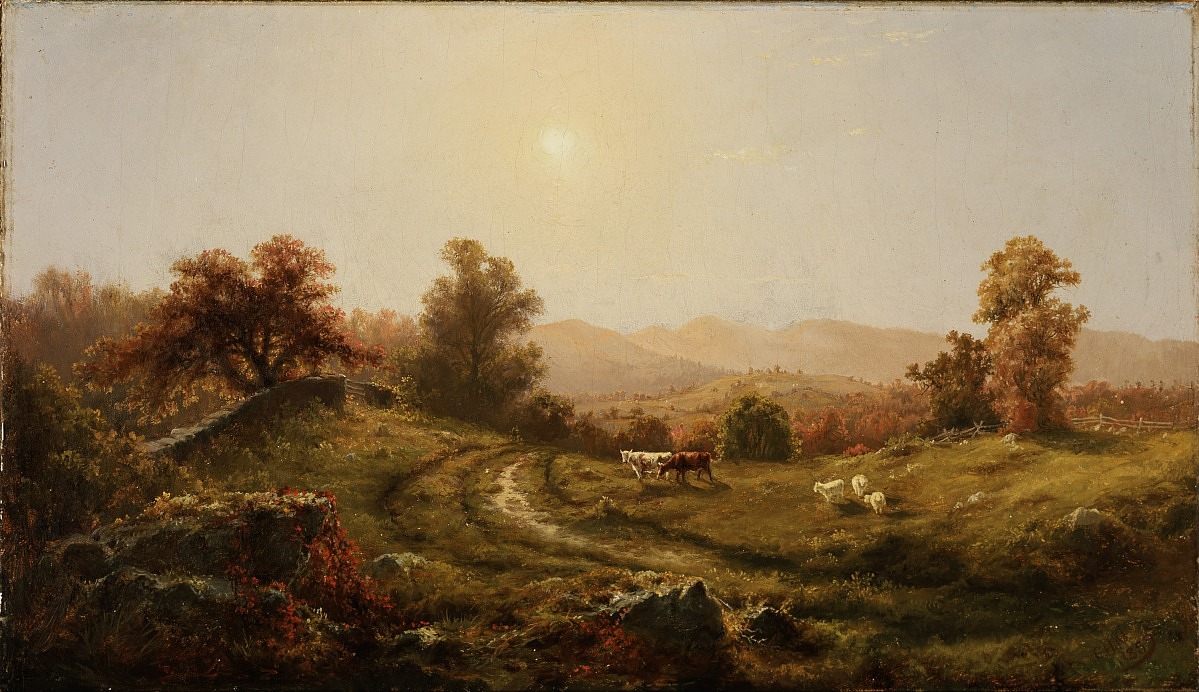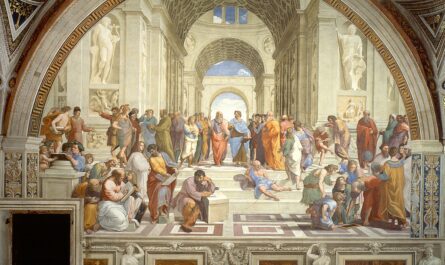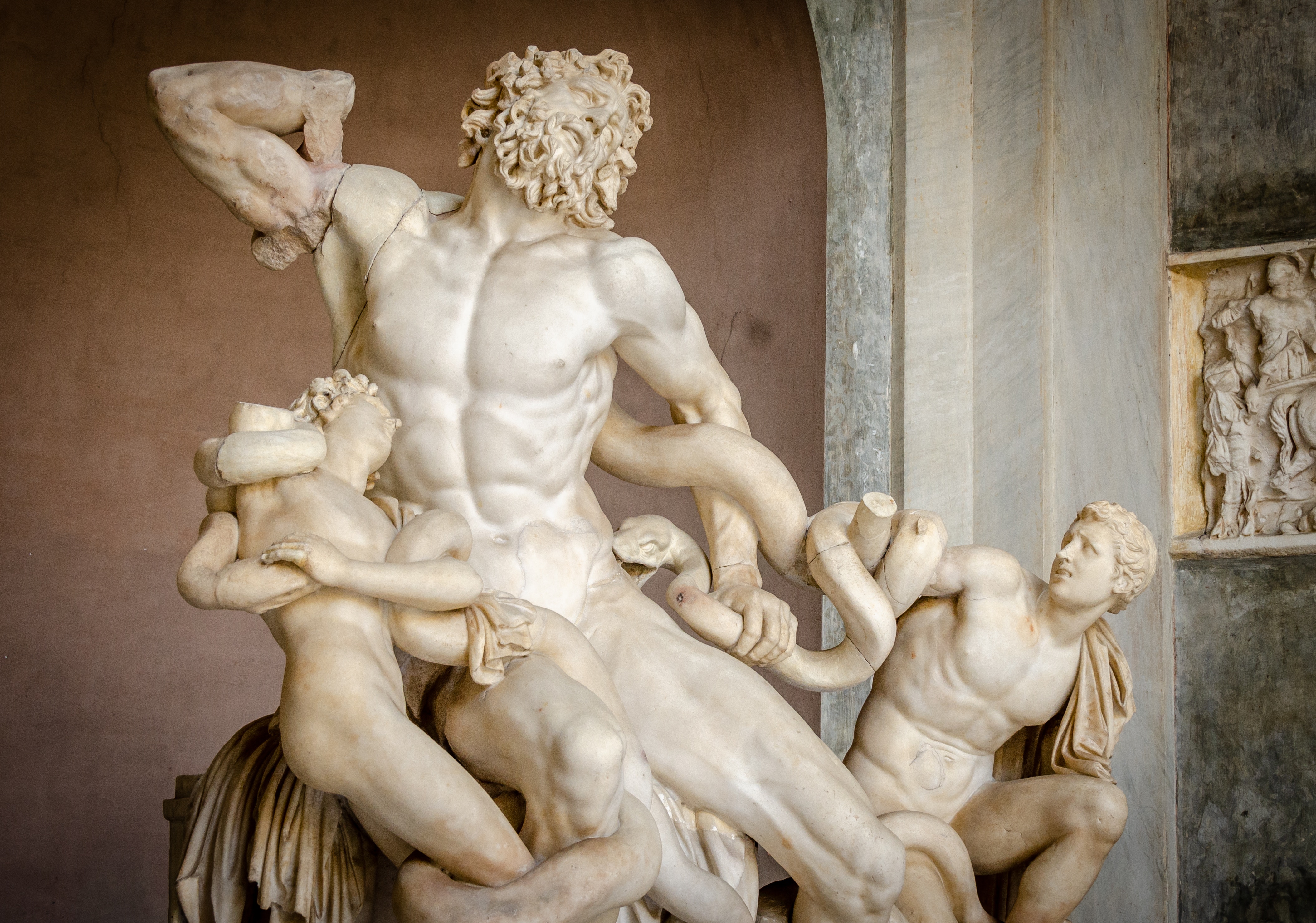Image above: Charles H. Moore, Landscape, 1859, oil on canvas, Smithsonian American Art Museum, Donated in memory of Lila and A. Russell Ellis by their sons., 1994.82
When we think of the word leisure, several things may come to mind. First, leisure tends to be thought of as simply non-working hours. Leisure also has a connotation of wealth or luxury, as something only a tiny fragment of the population could be considered to possess. Thirdly, the most commonly listed “leisure activity” is watching television, closely followed by the scrolling and surfing the internet. I will challenge these notions and demonstrate why these perspectives are inaccurate. Lastly, I’ll argue for a usage of leisure which is less dependent on economics, and more in line with the historic definition and purpose of leisure.
Ancient Greece
Leisure in ancient times was considered an end to itself. It is time set aside for pursuing interests which were personal and productive.
Aristotle considered leisure a requirement for attaining the highest knowledge. He even went so far as saying, “Play in order that you may work.” He knew that leisure was a critical part of creativity and inner growth. While history doesn’t record which enterprises he considered leisure, Aristotle does outline what it should look like; something moral which nourishes the soul and is highly purposeful and personal.
Plato, in Book Eight of The Republic, outlines education itself as being a kind of leisure. Certainly, education can only happen when a person’s basic needs are met. You simply can not concentrate on theories, intellectual pursuits, or contemplating life’s pleasures if you are hungry or unsafe. Accordingly, leisure occupies a higher position on Maslow’s hierarchy of needs.
The fact that ancient thinkers contemplated leisure, and that philosophical heavyweights like Aristotle and Plato in particular found it essential, presents an interesting perspective; leisure and philosophy are intimately connected. Philosophy is the pursuit of knowledge, of discovering the truth for its own sake. As such, philosophy employs methods of questioning in order to uncover the truth, nature, or essence of reality. It is not a superficial exercise in arguing to advance a particular viewpoint.
Likewise, leisure for these thinkers was enriching activities taken on for their own benefits. The phrase “for their own benefits” is the key to understanding leisure; many people undertake learning or hobbies pursuing advancement at work or within their communities. Those activities and motivations are fine; they simply aren’t leisure.
This is how the ancient Greeks thought about leisure, and using this perspective for contemplating how we spend our time can bring some mindfulness to our daily activities. It is in leisure time we discover what really matters. Our leisure time informs and dictates the industry we decide to commit our working hours to.
The Theory of the Leisure Class
In the 1300’s leisure meant the “opportunity to do something, chance, occasion, an opportune time.” The noun use of the infinitive leisir meant to “be permitted,” from the Latin licere, meaning “to be allowed.” However, later in the 1400-1500’s, it shifted from “opportunity afforded by freedom from necessary occupations” to “when one has time.”
For much of history, leisure, or “having the time” was virtually nonexistent. People spent most of their time on back-breaking labor around the clock to provide shelter, food, and supplies for themselves and their families. It was only as we settled into agricultural society, where there was still exhausting labor, but more stability, that men continued to venture out to hunt, leaving the rest of the settlement behind and sparking the beginnings of idle time.
In 1899, Thorstein Veblen invented the term “leisure class,” along with “conspicuous consumption,” in his 1899 Theory of the Leisure Class. Veblen argues that as humanity evolved and developed society, the masculine role of hunter and provider became increasingly entrenched. As society became less migratory and property rights were established, the seeds of the upper class were planted. These upper class aristocrats lived off the proceeds produced by those working their property, rendering the owner’s labor unnecessary. Leisure became peculiar to the upper class of society who could afford not to labor all day for wages.
In any society built on labor, which is to say, all modern societies, there must exist some proof of labor. Simply put, most people need to produce tangible results in order to provide food, shelter, and education for themselves and their families. We understand this mindset of “pulling your own weight”, or taking care of yourself and yours because it is still the standard for most of the world. Most commonly this proof is a physical or otherwise discernible product one may point to and say, “This is what I’ve been working on all day.” At one point in time it was the number of weapons and tools forged in a year, elsewhere it was the number of hours spent on the factory floor, today it may be the number of contacts made or emails sent. This is a source of legitimacy and pride, but also social currency. This is undoubtedly the camaraderie of the working class; the attitude that everyone is doing their best to do their jobs and provide for their families. We see this in every level of society, though, including the wealthier circles. This same human and social need for pride and legitimacy exists in the upper class. Instead of justifying their existence by manufacturing products for the market – such as forging horseshoes, or bushels of apples, this aristocratic branch, Veblen says, needed to find some way to productively pass their days.
In addition, during the chaste Victorian era of the late 1800’s, society was more modest and aligned with Biblical values. The idea of working for a daily wage became a moral tenet, aligned with the apostle Paul’s edict in Second Thessalonians, “For even when we were with you, we commanded you this: If anyone will not work, neither shall he eat.” This moral component, added to the natural impulse to fit in with our culture or group of people we live among and respect, would produce incredible social pressure on the upper class to prove they were using their time well. Upper class men in particular needed to prove they were still every bit as masculine and competent as their day-laboring counterparts; they needed some sort of trophy or proof of ability. They needed to demonstrate they were spending their days productively and in socially-approved ways.
This led to hunting clubs, sporting clubs, learning multiple languages, reading and writing, traveling, studying obscure sciences, learning and playing musical instruments, attending theatrical performances, and highlighting social or environmental needs to their similarly well-heeled friends. In short, competitions and social groups, all of which produce literal or symbolic trophies, to which the individual can point as proof of a productive existence. It actually doesn’t sound all that far off from today’s wealthy elite; speaking several languages, earning degrees in obscure subjects, and throwing benefit galas to raise funds for varied causes. The habits and customs of these upper class families became the norm, the kinds of things the lower classes emulate and mimic today. Today’s exclusive societies and markers of the elite class began out of a need to spend time purposefully, out of leisure.
Leisure was restricted to the upper class until the late 19th century when workers began taking holidays and weekends off. It seems it is during this period of social change – where weekends are becoming a part of the wider culture – that the definition of leisure also widens into simply “non-working time.” Indeed, this is the first time in history most people are exploring how to occupy themselves outside of work. Over the last century, more people have more free time than ever, yet leisure is an uncommon habit.
Leisure, as the ancient Greeks knew, is about edifying the inner person, about building yourself into the person you want to become. Leisure requires intention and purpose, as the late-19th century illustrates. Leisure is not an afterthought.
Our Hobbies are not Leisure Because They Don’t Make us Better
This is why activities like watching television or even reading aren’t necessarily true leisure. Those are simply ways to pass hours. They don’t create opportunities for growth or challenge you. Leisure emerged as evidence of a fruitful endeavor. Hunting, sports, studying languages; something you could point to and say, “This is what I do in my daily personal time.” By contrast, today we see most free time spent on television, social media platforms, and video games. It’s not that any of these things are good or bad in themselves, but the human cost of spending our time and mental energy on things which don’t serve any purpose beyond momentary entertainment. It’s the tendency to allow low-quality things to steal all our time, crowding out meaningful hobbies, a spiritual practice, or even the simple act of reading for interest’s sake.
Certainly today we live in a global society which values productivity, as evidenced from the astounding amount of productivity books, hacks, websites and tools all promising one weird trick to double your output. Nor is there anything wrong with being productive. However, it seems we’ve created an unnecessary duality in our time between working productively and mindless passivity, to the exclusion of leisure. Rather than the extremes of spending all of our time trying to hack ways of producing more, or completely turning our brains off the moment we clock out, we can each use our time to make ourselves a smarter, more empathetic, and enriched person. The idea of using our time to better ourselves simply because we can is uncommon, only embraced by uncommon people. For Plato, this was the mark of those most fit to rule society – those who chose to better themselves and fortify their minds.
Veblen goes on to describe how society seemed then to be developing toward valuing conspicuous consumption more than leisure activities. This is true today. It’s only the entrepreneurs – those who want to become the new leisure class – who seem at all interested in the hobbies or activities of the wealthy. Most people just hear about the millions of dollars the upper class throws around, or which of their ventures succeed and fail. Do we define wealth exclusively in terms of monetary spending, rather than a lack of constraints on time? This is what Sebastian de Grazia concluded in his 1962 book, Of Work, Time, and Leisure.
I’ll wager leisure has lost its luster precisely because we have so much free time. Most people work eight to ten hours daily during the week, and sleep between six and nine hours each night. This leaves the very generous gap of five to fourteen hours of time each day to put toward discretionary use. Based on historical data, we have more free time than any time in history, but adults also spend less time on education and what would be described as enriching activities. The US Bureau of Labor Statistics reports Americans averaged five hours per day of free time in 2019. This is waking time not spent at work. As mentioned earlier, most of that time is spent on television, social media, and video games.
Modern society affords us all much free time. Why don’t we prize it? Do we not consider time to be a measure of wealth?
Defining Leisure and a Return to Form
Leisure should refer to those activities you do which feed your soul and mind; which build you up as a person. Everything else are just free-time activities. If we reserve the term ‘leisure’ for only those things which are meaningful, we are more likely to take our time to consider what actually inspires, challenges, or interests us.
We should designate “leisure” to be those hobbies and activities we do in order to better ourselves. Leisure is how we ensure we continue to grow, learn, and improve across our lifetimes. The term has grown to include all non-working time, which is a mistake. If we consider leisure to be only those things which challenge and grow us, the term stands a chance to remind us to include edifying hobbies in our daily routines. Of course, there is also a chance that the term disappears, as true leisure activities all but already have. In defining and practicing leisure, though, we can better ourselves and save the institution.
“As seen from the economic point of view, leisure, considered as an employment, is closely allied in kind with the life of exploit; and the achievements which characterise a life of leisure, and which remain as its decorous criteria, have much in common with the trophies of exploit. But leisure in the narrower sense, as distinct from exploit and from any ostensibly productive employment of effort on objects which are of no intrinsic use, does not commonly leave a material product. The criteria of a past performance of leisure therefore commonly take the form of “immaterial” goods. Such immaterial evidences of past leisure are quasi-scholarly or quasi-artistic accomplishments and a knowledge of processes and incidents which do not conduce directly to the furtherance of human life.”
-Thorstein Veblen, The Theory of the Leisure Class
The Greeks valued leisure for the edification of the person. We should adopt this perspective, and be more specific in our definitions of and goals for leisure. As free time becomes more common, we tend to spend less time considering what we do with that time.
We should consider leisure only those things we do to grow and better ourselves.Such things as education for your own interest, reading, dinner with friends, conversation, maybe preparing a special meal, woodworking or other crafty hobbies; all of these fit under within idea of leisure. Asking yourself why you are participating in an activity is a great way to determine satisfying and worthwhile ways of occupying time.
There should remain a distinction between leisure and simply living a healthy lifestyle. Playing sports and exercise, while healthy hobbies usually done during non-work hours, aren’t considered leisure according to our narrow definition. They are exercise and simply a part of a daily healthy routine. Exercise is primarily done for physical health, just like eating nourishing food. Both can certainly improve your mind, but aren’t done for that reason.
Just as hygge describes a mood of coziness and feelings of wellness and contentment, leisure should describe the category of hobbies we participate in solely for the personal benefits they develop within us. Each are subjective, but still narrow enough to carry a distinct tone. Both refer to the reason for the actions, not necessarily the actions themselves.
Leisure refers to purposeful activities that nourish and enrich a person. While we have more free time than ever, we engage in less true leisure time. We should allow the narrow definition of leisure to inspire us to carefully consider how we spend our non-working time, and to ask ourselves about the purposes or goals we have in mind for how we spend our time. We should consider prioritizing truly inspiring and fulfilling leisure.
In doing research for this essay, I’ve been reminded to pick my camera back up and practice photography more often, for the sake of developing that skill for my own enjoyment.In light of this definition of leisure time, what activities make up your leisure time? Do you have leisurely habits?




